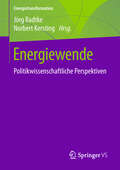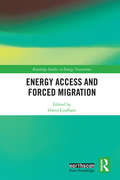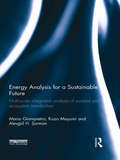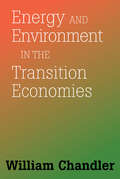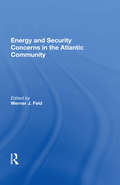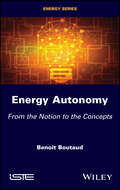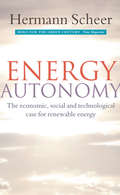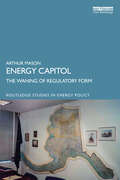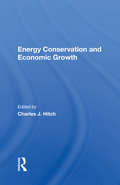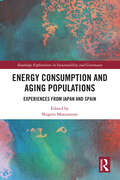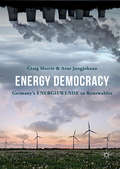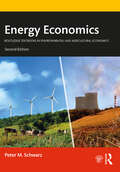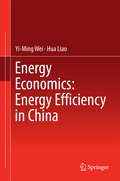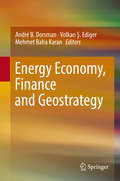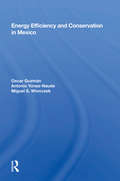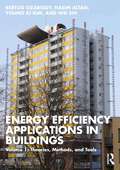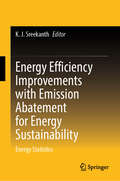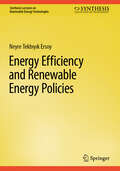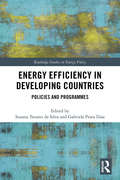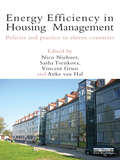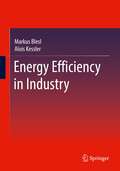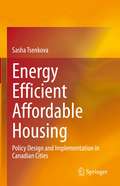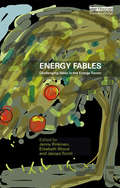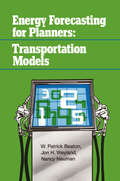- Table View
- List View
Energiewende: Politikwissenschaftliche Perspektiven (Energietransformation Ser.)
by Norbert Kersting Jörg RadtkeDie Energiewende ist inzwischen Gegenstand der sozialwissenschaftlichen Fachdisziplinen geworden. Häufig konzentriert sich die wissenschaftliche Auseinandersetzung auf einen speziellen Themenkomplex. Im vorliegenden Sammelband werden erstmals originär politikwissenschaftliche Beiträge gebündelt. Das Themenspektrum reicht von Energiearmut bis zu Energiewende-Governance: Lokale Konflikte, politische Partizipation und soziales Engagement sowie regionale Strategien werden umfassend dargestellt. Daneben werden Energiepolitiken anderer Länder analysiert sowie eine theoretische Einordnung der Energietransformation vorgenommen. Der Band bietet damit einen ersten Einstieg in die Welt der Energiewende aus politikwissenschaftlicher Perspektive.
Energy Access and Forced Migration (Routledge Studies in Energy Transitions)
by Owen GrafhamThis edited collection brings together a selection of expert authors and draws on a wide range of case studies, geographies, and perspectives to explore the links between forced migration and energy access. This book addresses the paucity of academic study on how energy is delivered to the millions of people currently forcibly displaced. The contributions throughout assess the current energy governance regimes, models of delivery, and innovative solutions that are dictating how energy is – and can be – provided to those who have been forced to move away from their homes. By bringing together author-teams of practitioners, academics, businesses, and policy makers, this collection encourages interdisciplinary dialogue about the best way of approaching energy provision for the forcibly displaced. This book will be of great interest to students and scholars of energy access and policy, environmental justice and equity, and migration and refugee studies.
Energy Analysis for a Sustainable Future: Multi-Scale Integrated Analysis of Societal and Ecosystem Metabolism
by Mario Giampietro Kozo Mayumi Alevgül H. ŞormanThe vast majority of the countries of the world are now facing an imminent energy crisis, particularly the USA, China, India, Japan and EU countries, but also developing countries having to boost their economic growth precisely when more powerful economies will prevent them from using the limited supply of fossil energy. Despite this crisis, current protocols of energy accounting have been developed for dealing with fossil energy exclusively and are therefore not useful for the analysis of alternative energy sources. The first part of the book illustrates the weakness of existing analyses of energy problems: the science of energy was born and developed neglecting the issue of scale. The authors argue that it is necessary to adopt more complex protocols of accounting and analysis in order to generate robust energy scenarios and effective assessments of the quality of alternative energy sources. The second part of the book introduces the concept of energetic metabolism of modern societies and uses empirical results. The authors present an innovative approach – Multi-Scale Integrated Analysis of Societal and Ecosystem Metabolism (MuSIASEM) – capable of characterizing the quality of alternative energy sources in relation to both environmental constraints and socio-economic requirements. This method allows the metabolic pattern of a society to be described in relation to its feasibility, when looking at biophysical factors, and desirability, when looking at socio-economic factors.Addressing the issue of scale in energy analysis by cutting through the confusion found in current applications of energy analysis, this book should be of interest to researchers, students and policy makers in energy within a variety of disciplines.
Energy And Environment In The Transition Economies: Between Cold War And Global Warming
by William ChandlerEnergy and environmental issues in the former Soviet sphere rank as global policy priorities for three reasons. First, civilian application of military nuclear materials multiplies the threat of terrorism. Second, Russian and Caspian oil resources affect world markets, Western energy security, and regional stability. Third, climate change may become a global challenge commensurate with the Cold War, and the transition economies--the former Soviet Union and Eastern Europe--offer the world's largest and cheapest near-term opportunities for curbing greenhouse gas emissions. Yet, the region remains unprepared to deal with these issues, and Western assistance has failed to help. A "second generation" of reform efforts is needed, led from within, but supported by the West. In Energy and Environmental Policies in the Transition Economies William Chandler synthesizes disparate, specialized analyses and publications. He draws on a relatively large body of research on energy technology, oil and gas markets, geopolitics, finance, economic reform, and environmental science specific to Russia, eastern Europe, and the transition economies. In successive chapters Chandler reviews energy use, energy efficiency, nuclear safety and security, petroleum geoeconomics, coal, utility monopoly and competition, and environmental and climatic change in the former Soviet Union and Central and Eastern Europe. Chandler also considers options for a "second generation" of reform efforts. The subject matter of the book is significant not only for the energy and environmental policies themselves, important though they are, but because those policies in turn affect regional political stability and Western energy security. Energy and Environmental Policies in the Transition Economies will be of considerable interest to policymakers in government, to private-sector actors, to academic scholars, and to students of international energy and environmental politics.
Energy And Security Concerns In The Atlantic Community
by Werner J. FeldThis book presents the proceedings of the fifth biannual symposium on "Energy and Security Concerns in the Atlantic Community". It aims to project what the future will hold for the peace movements and their effects on the policies of the Atlantic Community.
Energy Autonomy: From the Notion to the Concepts
by Benoit BoutaudEnergy autonomy is an emerging concept that is, as yet, poorly identified in France. It can mean taking ownership of certain issues related to energy, its production, or, indeed, becoming self-sufficient, and it can apply equally to individuals, communities and buildings.While there are numerous new developments – renewable energies, smart grids and self-consumption – it is becoming difficult to know what this idea of &“autonomy&” covers, just as it is difficult to define &“independence&” and &“self-sufficiency&”, which are often associated with it. However, these three concepts are key to thinking about the energy system and deciding its future. Covering distinct ideas, they are often reduced to economic and productive factors. This ambiguity in their meanings is responsible for the misunderstandings, delusions and obstacles that hamper the implementation of the energy transition.This book deconstructs the common idea of autonomy in favor of a set of more operational concepts. It demonstrates that these ideas are not interchangeable but rather represent practical and constructive tools for action. The world of energy is changing, and therefore we must rethink energy autonomy.
Energy Autonomy: The Economic, Social and Technological Case for Renewable Energy
by Hermann ScheerFor 200 years industrial civilization has relied on the combustion of abundant and cheap carbon fuels. But continued reliance has had perilous consequences. On the one hand there is the insecurity of relying on the world's most unstable region - the Middle East - compounded by the imminence of peak oil, growing scarcity and mounting prices. On the other, the potentially cataclysmic consequences of continuing to burn fossil fuels, as the evidence of accelerating climate change shows. Yet there is a solution: to make the transition to renewable sources of energy and distributed, decentralized energy generation. It is a model that has been proven, technologically, commercially and politically, as Scheer comprehensively demonstrates here. The alternative of a return to nuclear power - again being widely advocated - he shows to be compromised and illusory. The advantages of renewable energy are so clear and so overwhelming that resistance to them needs diagnosis - which Scheer also provides, showing why and how entrenched interests and one-dimensional structures of thinking oppose the transition, and what must be done to overcome these obstacles. The new book from the award-winning author of THE SOLAR ECONOMY and A SOLAR MANIFESTO demonstrates why the transition to renewable energy is essential and how it can be done.
Energy Capitol: The Waning of Regulatory Form (Routledge Studies in Energy Policy)
by Arthur MasonEnergy Capitol explores the waning of regulatory politics surrounding large-scale energy systems in the United States at the turn of the millennium.Throughout the twentieth century, large-scale energy systems in North America and Europe were highly regulated by a national political community whose decision-making authority relied on positions of bureaucratic and capitalist-led industry organization. After restructuring in energy markets such as natural gas and electricity during the 1980s, the culture of power surrounding political decision-making began to decline. Against this backdrop, Arthur Mason examines the struggle by oil companies and federal-state agencies to deliver natural gas from Alaska and Canada’s Mackenzie Valley to markets in midcontinental United States, highlighting regulatory collusion to advance their plans. Mason employs perspectives from anthropology, political science, sociology, and science and technology studies to analyze ethnographic data gathered at the Alaska State Legislature and in the Office of the Alaska Governor in Washington, D.C. The focus is primarily on plans for building an estimated $20 billion 3,500 mile pipeline to transport natural gas from the North American Arctic to midcontinental pipeline infrastructure in the United States. By illuminating key aspects of federal-state political decision-making processes on energy transportation infrastructure, Mason highlights the activities of economists, lawyers, and other regulatory intellectuals whose accumulated work impedes Arctic proposals through a reliance on judgments that no longer reflect the conditions in which large-scale projects are increasingly determined.Written by a leading expert in the field, this book will be of great interest to students and scholars of energy policy, environmental politics, governance, and regulation and risk. It will also be relevant to industry professionals working in environmental NGOs and government departments in energy and climate forecasting.
Energy Conservation And Economic Growth
by Charles J. HitchIn this volume, eight energy experts address the question of how much energy conservation can contribute to national energy supplies and how it will affect economic growth. The authors differ in their assessment, some taking a pessimistic and others an optimistic view of conservation's ability to mitigate the damping effect of higher energy costs. They assign varying roles to conservation and energy supplies to meet social and economic goals, but agree on the need for more research. The areas of agreement include cost-effective conservation policies which rely heavily on market forces. They differ in their interpretations of historical data and the potential for substitution.
Energy Consumption and Aging Populations: Experiences from Japan and Spain (Routledge Explorations in Sustainability and Governance)
by Shigeru MatsumotoThis book explores the impact of population aging on energy use patterns in society from both a theoretical and an empirical angle, with a specific focus on Japan and Spain.Many developed countries are currently experiencing both population aging and population decline, while the demand for social services, such as health care and public transportation, is expected to increase. This book expands upon these well-known socioeconomic challenges and explores the less well-known and more complex relationship between population aging, time allocation to social practices, and energy resource consumption. In the face of energy supply scarcity and climate change concerns, the impact of population aging on energy consumption is of paramount importance. By focusing on the effects of changing time allocation patterns on social practices, the book shows that the impact of population aging on energy consumption will affect not just only affect the residential sector but also other socio-economic sectors of society. Using data from Japan and Spain – currently among the fastest- aging countries in the world – the volume shows that the challenges of an aging society are far more complex and worrying than previously anticipated. If an aging society is an inevitable future, we need to prepare for the challenges that lie ahead.Written by researchers in the fields of demography, economics, environmental engineering, geography, physics, and transportation engineering, this book will compel academics and policy makers to reflect on these problems and act.
Energy Democracy
by Craig Morris Arne JungjohannThis book outlines how Germans convinced their politicians to pass laws allowing citizens to make their own energy, even when it hurt utility companies to do so. It traces the origins of the Energiewende movement in Germany from the Power Rebels of Schönau to German Chancellor Angela Merkel's shutdown of eight nuclear power plants following the 2011 Fukushima nuclear accident. The authors explore how, by taking ownership of energy efficiency at a local level, community groups are key actors in the bottom-up fight against climate change. Individually, citizens might install solar panels on their roofs, but citizen groups can do much more: community wind farms, local heat supply, walkable cities and more. This book offers evidence that the transition to renewables is a one-time opportunity to strengthen communities and democratize the energy sector - in Germany and around the world.
Energy Economics (Routledge Textbooks in Environmental and Agricultural Economics)
by Peter M. SchwarzEnergy Economics outlines the fundamental issues and possible solutions to the challenges of energy production and use, presenting a framework for decisions based upon sound economic analysis. This approach considers market forces and policy goals, including economic prosperity, environmental protection, and societal well-being. The second edition has been thoroughly updated, addressing dramatic shifts in the use of fuel and electricity, accelerated plans for the use of renewable energy, and pathways towards a lower-carbon future. A new chapter on electric vehicles examines its impact on transportation, the electricity market, and carbon emissions. Global examples throughout the book reflect the universal application of energy economics. With this economic foundation, coupled with perspectives from real-world applications, and perspectives from related disciplines, this text sharpens the student’s ability to understand, evaluate, and critique energy policy. A companion website provides reinforcement for students through multiple choice self-test quizzes and homework exercises, as well as additional materials for instructors. This textbook should be essential reading for students of energy economics, environmental and natural resource economics, energy-related disciplines, and general readers seeking to expand their knowledge of energy economics and policy.
Energy Economics: Energy Efficiency in China
by Yi-Ming Wei Hua LiaoThis book presents a succinct overview of research on China's Energy Efficiency as studied by the Center for Energy & Environmental Policy Research (CEEP), Beijing Institute of Technology (BIT). Energy efficiency, linking energy supply, demand and market, is crucial to the world's energy development. China consumes one fourth of the world's energy currently, however its per capital consumption is no more than half of that in OECD countries. This book provides a comprehensive treatment of the situation of China's energy development, proposes and summarizes the methodologies of energy efficiency measurement, and uses these methods to analyze the energy consumption at sectoral and provincial level, the impacts of economic structure on the energy macro-efficiency, the price elasticity of oil demand, and energy efficiency policies simulations. The book provides scientific support for researchers and policy makers dealing with energy efficiency.
Energy Economy, Finance and Geostrategy
by Mehmet Baha Karan André B. Dorsman Volkan Ş. EdigerThis volume investigates the impact of energy issues on geostrategy. The crucial importance of energy and the fact that fossil fuels are not equally distributed among countries means that decisions are not only based on financial arguments, but also on the political impact. It can be said that "Energy is Politics". In three parts - 1) Energy Economy; 2) Finance; and 3) Geostrategy - academics and practitioners address both economic and political questions and present cases from several countries.This is the sixth volume in a series on energy organized by the Centre for Energy and Value Issues (CEVI). The previous volumes in the series were: Financial Aspects in Energy (2011), Energy Economics and Financial Markets (2012), Perspectives on Energy Risk (2014), Energy Technology and Valuation Issues (2015) and Energy and Finance (2016).
Energy Efficiency And Conservation In Mexico: Perspectives On Efficiency And Conservation Policies
by Oscar GuzmánIn comparing the degree of efficiency in energy production and the uses to which energy resources are allocated in Mexico with those in other countries, this book addresses three basic questions: What are the major reasons for differences in energy efficiency between industrial economies and a newly industrializing country like Mexico? To what extent is energy conservation possible in the Mexican economy? And what are the social and economic benefits of more efficient use and conservation of energy in comparison with their costs? Using the history and operations of two state-owned energy agencies, PEMEX and the Federal Electricity Comission, as case studies, the authors explore the patterns of energy use in all major sectors of the economy and discuss the prospects for energy-saving policies between the mid-1980s and the end of the century.
Energy Efficiency Applications in Buildings: Volume 1: Theories, Methods, and Tools
by Wei Shi Bertug Ozarisoy Hasim Altan Young Ki KimEnergy Efficiency Applications in Buildings presents an investigation into the energy use and measures to improve the energy efficiency of existing building stock in the UK. The aim of this research is to assess the domestic energy use of statistically representative residential buildings and their occupants’ thermal comfort by considering the significant impact of overheating risks on energy consumption and occupants’ well-being.Divided into two volumes, these books present energy consumption and thermal comfort in the construction sector as a complex socio-technical problem that involves the analysis of an intrinsic interrelationship amongst dwellings, occupants, and the environment. Using case studies, the authors demonstrate the significance of improving energy efficiency and its impact on occupants during long-term heatwaves in the summer. Additionally, the volumes demonstrate how dynamic thermal energy simulation can be used as a learning laboratory for future trends in housing energy consumption reduction.Volume 1: Theories, Methods, and Tools presents the background to the research and the assessment methods and tools adopted by the research team.Volume 2: Performance Evaluation and Retrofitting Strategies describes the case studies and building performance and post-occupancy evaluations, before making strategic policy and retrofitting recommendations.The research and roadmap presented in these volumes can be used as a guidance tool for building energy modelling and performance simulation, enabling architects, building engineers, and other practitioners to close the gap between the current understanding and the actual performance of existing building stocks.
Energy Efficiency Improvements with Emission Abatement for Energy Sustainability: Energy Statistics
by K. J. SreekanthThe book titled “Energy Efficiency Improvements with Emission Abatement for Energy Sustainability” targets primarily academicians and policy-makers who are involved and practiced in the energy and environment field. It is useful for students, scholars, who wish to obtain an inclusive impression, and those with advanced knowledge can obtain a deeper knowledge of specific issues related with energy statistics, emission reduction and sustainability. Policy-makers in international organizations, national & local governments, companies & trade associations, and NGOs can use it as a source of inspiration for future policymaking as well as for a better understanding about the consumer behavior while dealing with energy. The book obviously targets those interested in energy and associated aspects, its setbacks, though there may be close parallels with social and behavioral issues. While its scope is international, this book may also be relevant to readers concerned with domestic areas of precise country and continental interest, as these are increasingly uncovered to developmental issues in energy. The book addresses the following major aspects: • The energy statistics assessment for energy sustainability with an emission abatement approach. • The relationship between energy statistics and major greenhouse gas emissions, explained in the energy efficiency context. • The relevant policy directions in the energy statistics direction. • The impact of climate change, and its effect on various sectors/countries and the role of energy statistics on them. Those who are interested in the interpretation of statistical data on energy resources and pollution, latest innovations in energy markets, energy technology and services, carbon mitigation, can make this book useful.
Energy Efficiency and Renewable Energy Policies (Synthesis Lectures on Renewable Energy Technologies)
by Neyre Tekbıyık ErsoyAlthough there are many publications about energy efficiency policies and renewable energy policies, most of them are specific to some countries or regions. As most of these publications focus on country and region specific issues, they may not be preferred in teaching the energy related policies in a university not from that country or region. The author has been teaching a course called “Energy Laws and Policies” for a long time. Over the years, she prepared detailed lecture notes about energy efficiency policies and renewable energy policies which are the basis of this book. It can be used by instructors around the World, or by students/individuals who want to learn more about these policies. It is aimed to serve as a textbook for undergraduate, and graduate level students. The book includes the definitions, types, advantages/disadvantages of energy efficiency policies and renewable energy policies in general. It also provides a comparative analysis on energy efficiency and renewable energy policy preferences of different countries. It will help the students to better understand the major differences between policies, how they are applied and which policies should be preferred under which conditions.
Energy Efficiency in Developing Countries: Policies and Programmes (Routledge Studies in Energy Policy)
by Suzana Tavares Da Silva Gabriela Prata DiasThis book presents a comparative analysis of energy efficiency policies in developing countries. Although there is a vast amount of literature available about renewable energy policy and implementation in the developing world, energy efficiency tends to lack attention. This book fills this lacuna by examining the current state of the field and scope for future improvements. Drawing on a wide range of case studies including Brazil, China and Chile, the authors use a comparative approach to examine the policies and programmes being implemented, looking at the existing legal frameworks and regulatory challenges. By showcasing stories of success, as well as barriers to energy efficiency, they highlight the opportunities for increased energy access and efficiency and demonstrate how these opportunities may directly impact on climate change mitigation. This volume will be a useful resource for scholars and practitioners with an interest in energy policy and efficiency, climate change and international development.
Energy Efficiency in Housing Management: Policies and Practice in Eleven Countries
by Vincent Gruis Sasha Tsenkova Nico Nieboer Anke Van HalThe embedding of energy efficiency in the management of individual housing organisations is crucial for the realization of current ambitious energy efficiency policies. This issue is examined for the first time in this book through an analysis of selected case studies in new ‘green’ buildings, as well as in the retrofitting of existing housing, maintenance and budgeting. The links between policy ambitions, practice and housing management institutions are given particular attention. Thus the book is primarily concerned with how ambitions about energy efficiency are carried forward in investment decisions at the housing estate level. Technical and financial issues relevant for this are also addressed. The editors combine a wealth of experience in comparative research on housing policy and housing management with a strong academic background in housing studies and economics. The book aims to be internationally comparative including a range of countries. A chapter will be devoted to each of the following countries:- Sweden; Denmark; Germany; the Netherlands; England; France; Switzerland; Austria; Czech Republic; Slovenia; Canada. The book will appeal to a large audience of students and academics who are concerned with housing issues, urban policy and politics as well as to those engaged in research in energy efficiency policies in the built environment.
Energy Efficiency in Industry
by Markus Blesl Alois KesslerThis book quantifies the potential for greater energy efficiency in industry on the basis of technology- and sector-related analyses. Starting from the methodological fundamentals, the first part discusses the electricity- and heat-based basic technologies and cross-sectional processes on the basis of numerous application examples. In addition to classic topics such as lighting and heat recovery, the study also covers processes that have received less attention to date, such as drying and painting. The second part is devoted to energy-intensive industries, in particular metal production and processing, the manufacture of the non-metallic materials cement and glass, and the chemical, paper, plastics and food industries. Both parts are concluded by placing them in a larger energy and economic context. The findings are condensed into checklists at many points and summarized in the overall view at the end to form generally applicable recommendations.This book is a translation of the original German 2nd edition Energieeffizienz in der Industrie by Markus Blesl and Alois Kessler, published by Springer-Verlag GmbH Germany, part of Springer Nature in 2017. The translation was done with the help of artificial intelligence (machine translation by the service DeepL.com). A subsequent human revision was done primarily in terms of content, so that the book will read stylistically differently from a conventional translation. Springer Nature works continuously to further the development of tools for the production of books and on the related technologies to support the authors.
Energy Efficient Affordable Housing: Policy Design and Implementation in Canadian Cities
by Sasha TsenkovaThis book provides the first comparative assessment of the energy-efficiency retrofit programs in the social housing sector of Canadian cities, focusing on program efficiency and effectiveness. The analytical framework explores key policy instruments - regulatory, fiscal and institutional - in relation to major results achieved. The approach is interdisciplinary, supported by rich empirical data from case studies, observations and interviews. The book explores important strategies for the provision of green and affordable housing, while addressing climate change imperatives and resilience issues. This is of great interest to researchers, policy makers, city leaders, professionals and students. Its value added contribution to scholarship is complemented by practical relevance for social housing organisations in countries with a small residual housing sector. It offers valuable lessons for the design, planning and implementation of energy retrofit programs in North America and beyond.
Energy Efficient Cities: Assessment Tools and Benchmarking Practices
by Ranjan K. BoseUrban areas account for two-thirds of global energy requirements while housing approximately half of the world's population. With current projections indicating that 70 percent of the world's population will live in cities by 2050, an increase in urban energy use is inevitable. In the face of this growing energy demand, developing climate-friendly urban energy solutions, while protecting the urban development that is crucial to socioeconomic progress in developing countries, is imperative. In an effort to catalyze solutions that would delink high levels of carbon-intensive energy use from urban growth, the Energy Sector Management Assistance Program (ESMAP) of the World Bank launched the Energy Efficient Cities Initiative in October 2008. 'Energy Efficient Cities: Assessment Tools and Benchmarking Practices' is a product of that initiative. The analytical tools and policy insights offered in this volume extend from integrated assessments of new cities to the impacts of socioeconomic, climate, and demographic changes on existing cities. In addition, the documentation and benchmarking of a variety of low-carbon and carbon-neutral good practices provide a range of practical insights on plausible energy efficient interventions in urban sectors. This book will be of particular interest to policy makers, development practitioners, and decision makers in the private sector, as well as researchers within nongovernmental organizations and the academic community.
Energy Fables: Challenging Ideas in the Energy Sector
by Jacopo Torriti Elizabeth Shove Jenny RinkinenEnergy Fables: Challenging Ideas in the Energy Sector takes a fresh look at key terms and concepts around which energy research and policy are organised. Drawing on recent research in energy and transport studies, and combining this with concepts from sociology, economics, social theory and technology studies, the chapters in this collection review and challenge different aspects of received wisdom. Brief but critical introductions to classic notions like those of ‘energy efficiency’, ‘elasticity’, ‘energy services’ and the ‘energy trilemma’, together with discussions and analyses of well-worn phrases about ‘low hanging fruit’ and ‘keeping the lights on’, articulate aspects of the energy debate that are often taken for granted. In re-working these established themes and adding twists to familiar tales, the authors develop a repertoire of new ideas about the fundamentals of energy demand and carbon reduction. This book presents a valuable and thought-provoking resource for students, researchers and policy-makers interested in energy demand, politics and policy.
Energy Forecasting for Planners
by Jon H. WeylandWith the increased public awareness of a deepening energy crisis, governments at all levels have begun to examine their ability to act meaningfully in response to forms of short- and long-term energy-related political pressures. Emergency preparedness, conservation programs, and contingency planning have become watchwords in our new energy bureaus.
